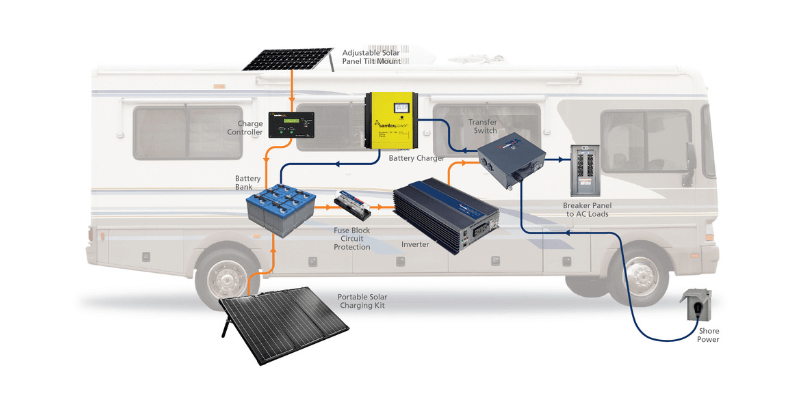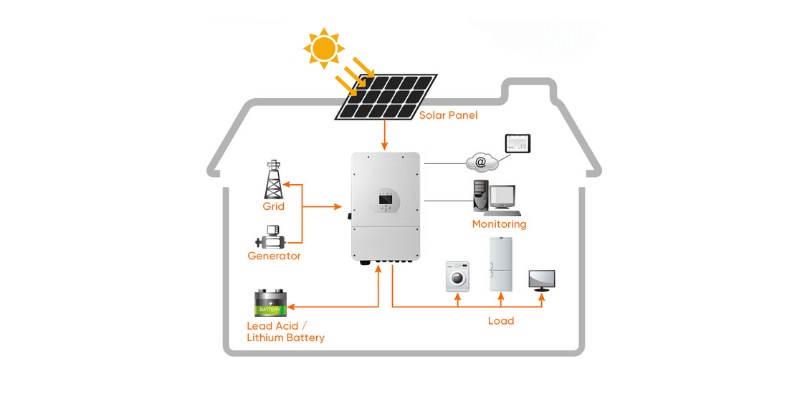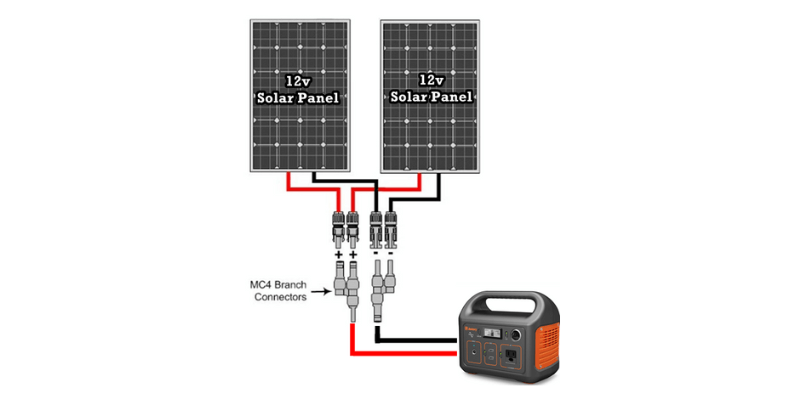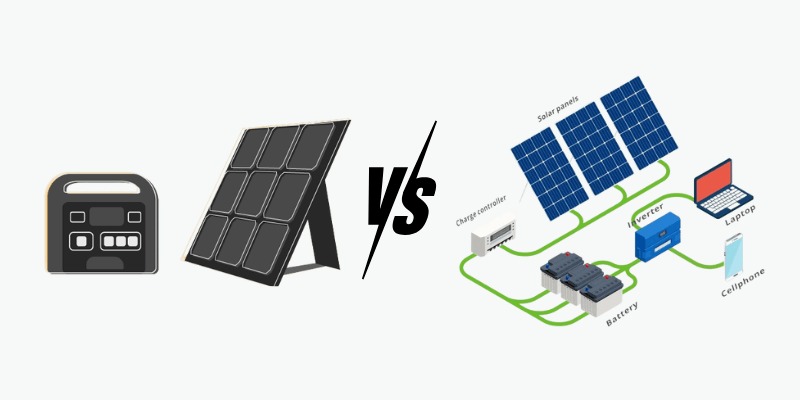หากคุณยังใหม่กับพลังงานแสงอาทิตย์ คุณอาจสงสัยว่าจะเริ่มต้นอย่างไร โดยพื้นฐานแล้ว คุณจะต้องเลือกระหว่างเครื่องกำเนิดพลังงานแสงอาทิตย์และระบบสุริยะแบบเต็ม เรามาสำรวจตัวเลือกเหล่านี้ ว่ามันแตกต่างอย่างไร และมีความหมายอย่างไรต่อการเดินทางด้วยพลังงานสะอาดของคุณ!
เครื่องกำเนิดพลังงานแสงอาทิตย์คืออะไร?
เครื่องกำเนิดพลังงานแสงอาทิตย์คือ โซลูชันพลังงานแบบพกพา ที่รวมแบตเตอรี่ อินเวอร์เตอร์ และตัวควบคุมการชาร์จพลังงานแสงอาทิตย์เข้าด้วยกัน
โดยจะจับพลังงานแสงอาทิตย์ด้วยแผงแบบพกพา เก็บไว้ในแบตเตอรี่ และจ่ายไฟผ่านเต้ารับ AC, DC หรือ USB สำหรับอุปกรณ์อิเล็กทรอนิกส์และเครื่องใช้ไฟฟ้าขนาดเล็ก
ระบบสุริยะแตกต่างจากเครื่องกำเนิดพลังงานแสงอาทิตย์อย่างไร?
ก ระบบสุริยะ ทำหน้าที่เหมือนกับเครื่องกำเนิดพลังงานแสงอาทิตย์ แต่มีความแตกต่างที่สำคัญ ทั้งสองแปลงแสงแดดเป็นไฟฟ้าที่ใช้งานได้เพื่อการใช้งานทันทีหรือเก็บแบตเตอรี่
อย่างไรก็ตาม ระบบพลังงานแสงอาทิตย์ประกอบด้วยการตั้งค่าเฉพาะที่มีการติดตั้งแผงในบ้าน รถบ้าน หรือเรือ หรือผ่านแผงแบบพกพาที่รวมอยู่ในระบบที่สมบูรณ์

การเปรียบเทียบ
อยากรู้ว่าตัวเลือกเทคโนโลยีพลังงานแสงอาทิตย์ทั้งสองนี้เปรียบเทียบกันอย่างไร และทางเลือกใดที่ดีที่สุดของคุณ? เราได้แจกแจงความแตกต่างในห้าประเด็นสำคัญเพื่อช่วยคุณตัดสินใจ
การใช้งาน
เครื่องกำเนิดไฟฟ้าพลังงานแสงอาทิตย์สามารถพกพาได้ ช่วยให้คุณสามารถจัดเก็บและใช้งานได้ตามต้องการ ทำให้เป็นตัวเลือกที่ดีสำหรับการใช้งานหลายประเภท
ในทางตรงกันข้าม ระบบพลังงานแสงอาทิตย์จำเป็นต้องมีการติดตั้งแบบถาวร โดยเชื่อมต่อกับบ้าน รถบ้าน หรือระบบไฟฟ้าของเรือ การตั้งค่านี้ช่วยลดความจำเป็นในการกำหนดค่าใหม่ และรับประกันพลังงานที่ต่อเนื่องขณะเคลื่อนที่ ด้วยเหตุนี้ จึงให้พลังงานโดยรวมมากขึ้นจากแผงขนาดเดียวกัน
ความจุแบตเตอรี่
กำลังการผลิตเป็นตัวกำหนดระยะเวลาที่เครื่องกำเนิดไฟฟ้าพลังงานแสงอาทิตย์สามารถจ่ายไฟให้กับอุปกรณ์ได้ ตั้งแต่ 300 ถึง 2,000 วัตต์-ชั่วโมง (Wh) ซึ่งจะช่วยให้สมาร์ทโฟนชาร์จได้นานหลายสัปดาห์ แล็ปท็อปใช้งานได้หลายวัน หรือตู้เย็นขนาดเล็กเย็นได้นานหลายชั่วโมง
ระบบพลังงานแสงอาทิตย์เต็มรูปแบบมีแบตเตอรีแบตเตอรีขนาดใหญ่ขึ้นโดยวัดเป็นกิโลวัตต์-ชั่วโมง (kWh) โดยปกติตั้งแต่ 5 กิโลวัตต์ชั่วโมงไปจนถึงมากกว่า 30 กิโลวัตต์ชั่วโมง ซึ่งได้รับการออกแบบมาเพื่อรักษาความต้องการพลังงานทั้งหมดเป็นเวลาหลายวันโดยไม่มีแสงแดด

การลงทุนครั้งแรก
งบประมาณของคุณจะส่งผลต่อการเลือกระหว่างเครื่องกำเนิดไฟฟ้าพลังงานแสงอาทิตย์และระบบแบบดั้งเดิม
เครื่องกำเนิดไฟฟ้าพลังงานแสงอาทิตย์กำลังไฟต่ำสามารถซื้อได้ในราคาไม่กี่ร้อยดอลลาร์เพื่อจ่ายไฟให้กับอุปกรณ์บางชนิด ระบบสุริยะแบบดั้งเดิมให้พลังงานมากกว่า แต่โดยปกติแล้วจะมีราคาหลายพันสำหรับค่าอะไหล่และการติดตั้ง
กำลังชาร์จใหม่
เครื่องกำเนิดไฟฟ้าพลังงานแสงอาทิตย์มีตัวเลือกการชาร์จที่ยืดหยุ่น สามารถชาร์จได้โดยใช้แผงโซลาร์เซลล์ เต้ารับ AC มาตรฐาน หรือพอร์ต 12V ของรถยนต์ การชาร์จผ่านพลังงานแสงอาทิตย์เพียงอย่างเดียวอาจใช้เวลาหลายชั่วโมง โดยอาศัยแผงโซลาร์เซลล์เป็นหลัก หลายเครื่องยังมีเครื่องกำเนิดไฟฟ้าสำรองหรือการเชื่อมต่อกริดเพื่อรักษาประจุแบตเตอรี่ในช่วงที่มีแสงแดดน้อย

การซ่อมบำรุง
แผงโซลาร์เซลล์ทั้งหมดจำเป็นต้องได้รับการตรวจสอบเพื่อให้แน่ใจว่ายังคงสะอาดและไม่มีรอยแตกร้าว
แผงระบบสุริยะ โดยเฉพาะแผงที่ติดตั้งถาวร จำเป็นต้องมีการบำรุงรักษามากขึ้นเนื่องจากการสัมผัสกับองค์ประกอบต่างๆ อย่างต่อเนื่อง
แผงโซลาร์เซลล์แบบพกพาติดตั้งหรือถอดได้ง่ายกว่า เครื่องกำเนิดไฟฟ้าพลังงานแสงอาทิตย์บำรุงรักษาง่ายกว่าเนื่องจากสามารถเคลื่อนย้ายได้ ไม่เหมือนระบบที่ติดตั้งถาวรซึ่งต้องปีนป่ายเพื่อตรวจสอบ
เครื่องกำเนิดพลังงานแสงอาทิตย์กับระบบสุริยะ: ผู้ชนะ
ไม่มีผู้ชนะขั้นสุดท้าย ทางเลือกที่ดีที่สุดขึ้นอยู่กับความต้องการเฉพาะของคุณ
- เลือกเครื่องกำเนิดไฟฟ้าพลังงานแสงอาทิตย์หากคุณให้ความสำคัญกับการพกพา ลดต้นทุนล่วงหน้า และความเรียบง่าย เหมาะอย่างยิ่งสำหรับกิจกรรมสันทนาการ (ตั้งแคมป์ รถบ้าน) เหตุฉุกเฉินระยะสั้น หรือการจ่ายไฟให้กับอุปกรณ์ขนาดเล็กอย่างเงียบๆ
- เลือกระบบสุริยะแบบเต็ม หากคุณต้องการความเป็นอิสระด้านพลังงานอย่างสมบูรณ์สำหรับบ้านหรือทรัพย์สินระยะไกลของคุณ ตัวเลือกนี้ต้องใช้เงินลงทุนเริ่มแรกที่มีขนาดใหญ่กว่าแต่อาจเข้าเกณฑ์ได้รับสิทธิประโยชน์ทางภาษี เหมาะสำหรับเครื่องใช้ไฟฟ้าที่มีกำลังวัตต์สูงและนำเสนอโซลูชั่นถาวรเพื่อรองรับภาระพลังงานทั้งหมดของคุณในระยะยาว
ระบบสุริยะคุ้มค่าไหม?
การพิจารณาว่าระบบสุริยจักรวาลเต็มรูปแบบคุ้มค่ากับการลงทุนหรือไม่นั้นจำเป็นต้องมีมุมมองระยะยาว แม้ว่าค่าใช้จ่ายล่วงหน้าจะสูง แต่ให้พิจารณาต้นทุนการเป็นเจ้าของทั้งหมดในช่วง 25-30 ปี
ผลประโยชน์ทางการเงิน ได้แก่:
- ค่าไฟฟ้าที่ลดลงหรือกำจัด: พลังงานจากแสงอาทิตย์นั้นฟรีเมื่อติดตั้งแล้ว
- การป้องกันต้นทุนพลังงานที่เพิ่มขึ้น: คุณได้รับฉนวนจากการเพิ่มขึ้นของอัตราค่าสาธารณูปโภคในอนาคต
- มูลค่าทรัพย์สินที่เพิ่มขึ้น: บ้าน เรือ หรือรถบ้านที่มีระบบพลังงานแสงอาทิตย์มักจะมีมูลค่าการขายต่อที่สูงกว่า
นอกจากนี้ ระบบพลังงานแสงอาทิตย์เต็มรูปแบบยังช่วยเพิ่มความยืดหยุ่นในช่วงที่ไฟฟ้าดับและภัยพิบัติทางธรรมชาติ ในขณะเดียวกันก็ลดการปล่อยก๊าซคาร์บอนของคุณได้อย่างมาก


